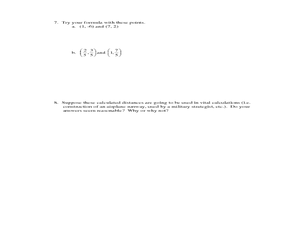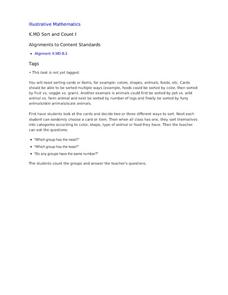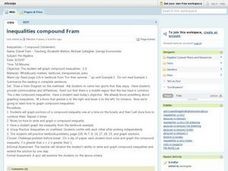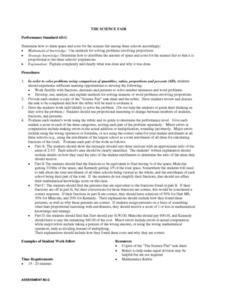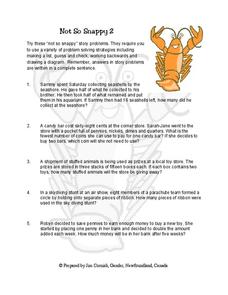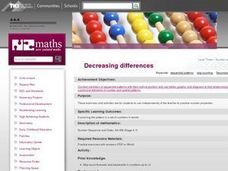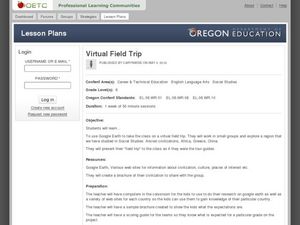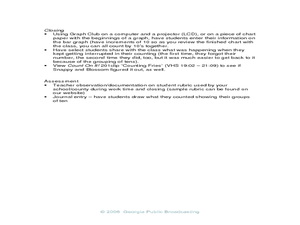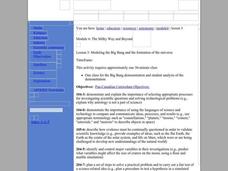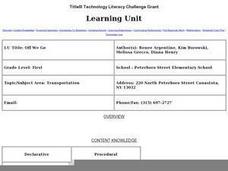EngageNY
Equivalent Ratios
Equivalent ratios show up on tape. Young mathematicians use tape diagrams to create equivalent ratios in the initial lesson on the topic. They learn the definition of equivalent ratios and use it to build others in the third segment of a...
Curated OER
Human Coordinate Plane, Using the Distance Formula
Students write the distance formula to solve equations for finding the distance between 2 points. In this distance formula lesson plan, students also write sentences explaining why their formulas would work.
EngageNY
Writing Addition and Subtraction Expressions
Symbols make everything so much more concise. Young mathematicians learn to write addition and subtraction expressions — including those involving variables — from verbal phrases. Bar models help them understand the concept.
EngageNY
The Relationship of Division and Subtraction
See how division and subtraction go hand-in-hand. The fourth installment of a 36-part module has scholars investigate the relationship between subtraction and division. They learn using tape diagrams to see that they can use repeated...
Illustrative Mathematics
Sort and Count
Young mathematicians are on their feet and moving around in this primary grade sorting activity. After giving each child an object or picture card, they then sort themselves into groups, counting to see which has the most or least...
Curated OER
Inequalities Compound Fram
Students practice graphing compound inequalities. They draw a Venn Diagram on two different sports visualizing that their is a middle section on commonality among the two sports groups and then relate that concept to compound inequalities.
Curated OER
Science Fair Space
Students determine the most equitable way to share space and cost between three schools for a fictional science fair. Given a diagram, a word problem, and a data set, students analyze and explain the best way for all schools to share...
West Contra Costa Unified School District
Mixture Problems
Mix up your lessons with the resource on mixture problems. Scholars use manipulatives to model and solve mixture problems. Individuals then set up both one- and two-variable equations to solve the problems.
Curated OER
Not So Snappy 2
In this math worksheet, students learn to use problem solving strategies such as making a list, guess and check, working backwards and drawing a diagram. Students read and solve 6 sentences.
Curated OER
Number Stories
Students write and solve various number stories. They solve number stories using one, two and three digit numbers. Students practice writing sentences using the following 6+1 traits, ideas and content, organization, word choice and...
Curated OER
Equal Shmequal by Virginia Kroll
Students read a book and complete exercises to explore the meaning of 'equals.' In this equal numbers lesson, students brainstorm the meaning of equals and read a story about the topic. Students use manipulatives to study balance and...
Curated OER
Decreasing Differences
Students identify and interpret the pattern within a set of numbers using words. Then they write rules in words using complete sentences. Students also highlight two similar sequences with the same difference in order to get the first...
Curated OER
Cutting the Wood
Students demonstrate and describe the effect of multiplying or dividing by a fraction less than or greater than one. They create and explain a variety of equivalent ratios that represent a given situation. Students draw a picture of...
Curated OER
Representing the Unknown
Second graders solve number sentences and examine how to apply basic operations of mathematics to those problems. They also use symbols to represent unknown numbers and how they are used in equations.
Curated OER
Lollies, Lollies, Lollies
Students listen to the problem read to them. They answer some simple questions using number sentences. They then compose a written record of the solution and share their approaches used.
Utah Education Network (UEN)
Linear Graphs Using Proportions and Rates
Using a TI-73 or other similar graphing calculator middle school math majors investigate the linear relationship of equivalent proportions. After a brief introduction by the teacher, class members participate in a timed pair share...
Rational Number Project
Initial Fraction Ideas Lesson 9 Overview
Visual models support young mathematicians with exploring equivalent fractions. Starting with a quick warm-up problem, children go on to work through a series of guiding practice problems before working with a partner identifying and...
EngageNY
Solving Area Problems Using Scale Drawings
Calculate the areas of scale drawings until a more efficient method emerges. Pupils find the relationship between the scale factor of a scale drawing and the scale of the areas. They determine the scale of the areas is the square of the...
Curated OER
Student Costs Data Table
Students compare and contrast two routes selected for a virtual field trip. They create a data table of educational activities, lodging, and meal costs using Microsoft Excel software.
Curated OER
Virtual Field Trip
This hands-on resource has future trip planners analyze graphs of mileage, gasoline costs, and travel time on different routes. While this was originally designed for a problem-solving exercise using a Michigan map, it could be used as a...
Curated OER
An Easier Way to Count: Using Groups of 10
Young scholars explore their counting skills. In this counting lesson, students group objects in sets of 10 to practice counting them. Young scholars also practice graphing the sets of objects they count. This lesson...
Curated OER
The Big Bang Theory
Learners will use scientific reasoning to formulate ideas about the formation of the universe using the Big Bang Theory. The use of critical thinking skills is part of the activity and the foundation of the scientific method will serve...
Curated OER
Michigan Virtual Field Trip
Students analyze data from a virtual field trip to Michigan. They conduct Internet research on mileage and travel time between cities, calculate and compare fuel costs, and research and calculate lodging, activities, and meal costs.
Curated OER
Off We Go
First graders identify different types of transportation, and explain why each is important. They pretend they are going on a trip. They choose their mode of transportation, and use play money to buy their tickets.
Other popular searches
- Diagramming Sentences Games
- Diagramming a Sentence
- Diagram Sentence
- Grammar Sentence Diagrams
- Color Coded Sentence Diagram
- Diagram Declarative Sentence
- Grammar Sentence Diagramming
- Diagramming Sentence
- Smart Board Sentence Diagram
- Sentence Diagram Grammar
- Sentence Diagrams Worksheets
- Sentence Diagram Gramme

